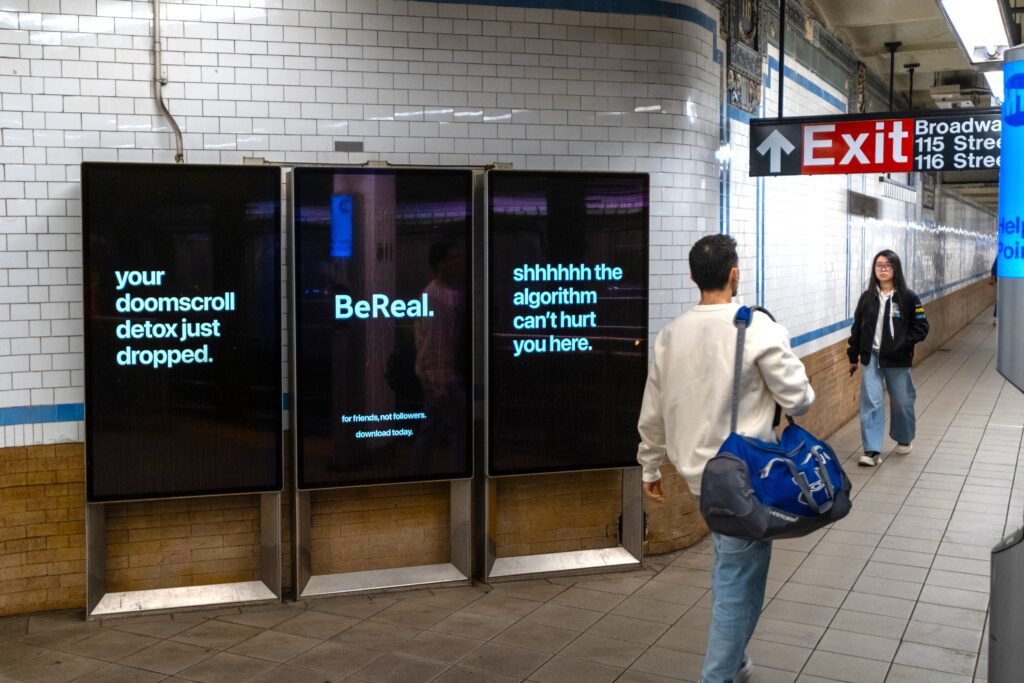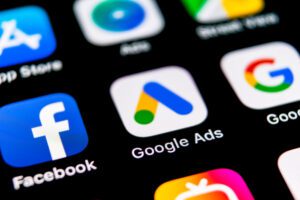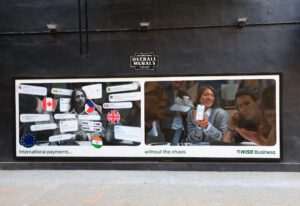Social media app BeReal prides itself on its authenticity. Rather than encouraging followers to endlessly scroll through heavily filtered posts from people and brands they may barely be familiar with, it sends users an audio reminder at a different time each day to share a pair of candid, unretouched photos with friends.
So to counter the growing entrenchment of AI in social media and daily life, BeReal decided now was the right time for a stateside marketing push.
In August, just months after the April launch of its native advertising platform in the U.S., the app held its first-ever “BeReal Takeover,” at University of Florida’s first football game of the season. Amid fireworks, Jumbotron messaging and encouragement from the game announcers, the 90,000 attendees were encouraged during halftime not only to post on BeReal but also to post their BeReal images on Instagram for the chance to win $5,000. The university subsequently posted about the event on its own social feeds as well as via email, with the latter generating more than 1 million impressions.
BeReal followed this up with its debut OOH campaign, placing black-and-white ads in bus kiosks and at subways stations around Manhattan’s Columbia University. Gen Z, who make up 90% of its more than 40 million global users, “are our main target overall,” says Benjamin Moore, BeReal U.S. Managing Director, “but the beauty of out-of-home is that your ad is seen by people from all backgrounds, all ages and all sorts of demographics.”
With the Columbia activation, which ran from Oct. 6 through Nov. 2, BeReal worked with creative agency NOISE to hone its messaging. Slogans on the OOH placements include “shhhhhh the algorithm can’t hurt you here” and “a BeReal a day keeps the brainrot away.”
“We want people to understand that we don’t have an algorithm that keeps serving content from people in a doom-scroll manner,” Moore explains. “The feed on BeReal is finite, meaning that once you’re done with the feeds of your 20 or 30 friends, there’s a message that says, Hey, enough scrolling for today, go back to living your real life.”
BeReal Prioritizes Engagement Over Reach
Encouraging users not to spend hours on the app might seem a sure way to deter advertisers. But Moore contends that brands are drawn to BeReal’s emphasis on engagement. Because users cannot view their friends’ daily posts without posting themselves, “the majority of our users are active by default,” he says. “In terms of click-through rate, we see results 5-10 times higher than on any other social platform.” And because bots cannot post photos of themselves, brands can be confident that the BeReal engagement numbers aren’t inflated, he adds.
Moore says that BeReal has attracted roughly 200 advertisers worldwide so far this year. The inclusion of ads in users’ feeds, which began with programmatic advertising last year, did receive some criticism for being antithetical to BeReal’s authenticity ethos, he admits: “But the people understand that if a service is free, we have to have a business model so that we can keep it free.”
Its native France, Japan and the U.S. are BeReal’s largest markets, with U.S. users exceeding 5 million. Growing that audience is a primary goal of the app’s marketing efforts. Forthcoming campaigns will include college ambassador programs and partnerships with companies such as Sweatpals, a platform that connects users with local fitness and wellness events. Fitness partnerships align with BeReal’s emphasis on doing instead of just scrolling and enable the app to connect with members of Gen Z who are “over the drinking and partying phase and like to connect on a Sunday morning and do an ice bath in Los Angeles,” Moore says. “It’s really important that we show up in communities and in moments where people can be the most real versions of themselves.”
In addition to increasing its user base, however, BeReal aims to remind people of the value of genuine content and connection. “When it comes to generating content or manipulating the attention of audiences across social, AI is like fire,” Moore says. “It’s great for many purposes, but fire burns. And that’s exactly what I’m trying to evangelize. I’m trying to tell people that they wouldn’t eat fake food, so why would they eat fake content?”








